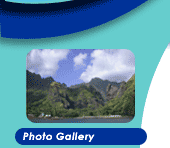











The Trials and Tribulations of Third-World InternetWhen you sit at your computer in comfort to check your e-mails or to surf the web, imagine how this might be done in third world countries. The cafes are big business, not only because of tourists, but because many locals do not have computers in their own homes. But most do not offer coffee or food; some do not even offer (or allow) water at the computer stations. Phone connections are unreliable, and the electricity often fails at the worst possible time. When I attempted to transmit the Rainmaker story at such a "café" in El Coco, our exit port in Costa Rica, the electricity failed for three hours and I ended up Fedexing the CD to my webmaster in San Diego. (The three-day Fed-ex I paid for took three weeks.) This is why I say "no promises," when it comes to updating this website. My expectations of timely internet updates from the Marquesas have been lowered as a result of reading of Rise and Mitch Hart's trials last June in the February 2002 issue of Santana, the SO-CAL sailing rag: "Incidentally, the internet has found its way to the Marquesas…from the anchorage at Taiohae, first you dinghy to the seawall and tie off. Then try to climb the half rusted-through ladder steps set flush in the seawall. There is no handhold on top, so wearing gloves, you try to get a grip on the fish-slime encrusted concrete. Sometimes the people fishing will get out of the way, other times they just grunt. Then hike about a mile uphill on the hot, shadeless asphalt road, gaining about 1,000 feet of elevation on the way to the hardware store. In the back of the hardware store in an unventilated corner are three computers. The owner is always using one, remote-controlled from his air-conditioned office upstairs. So the two dozen cruisers in town get to share the other two computers. When you finally get on line, you are spending $12 per hours, 15 minutes minimum. The server loses its connection to the internet so often, so any uploads of pictures take several attempts to be successful. The keyboards are in French, which for some unfathomable reason do not have a "delete" key. So if/when you make a mistake typing on the goofy keyboard (about 10 of the letters are in different locations) you have to arrow over the flaw, and then "backspace" in order to make the change. (On one occasion it took us 2.5 hours to successfully send two 800k photo files.) When ready to leave, pay the bill, hike back down the road, and hopefully discover that the kids playing on the quay have left only footprints in your dinghy. Other cruisers have had worse luck. A friend had fish guts in his-looked like the entrails of about a 20-pound Dorado. Another cruiser with an aluminum dinghy came back and found his floating upside down, with the prop sticking in the air like an ill-designed wind generator. Seems the kids like to jump up and down on the gunnels, and his sabot-type boat was not quite as stable as an inflatable." Credits: |
|
|
|
|
|
|
 |
 |
 |
|
|||||||||
|
|
|
||||||||||||
|
|
|
||||||||||||
|
|
|
||||||||||||
|
|
|
|
|
|
|
|
|
|
|||||
|
|
|
||||||||||||
|
|
|
||||||||||||
 |
 |
|
|||||||||||
|
|
|
||||||||||||
|
|
|
||||||||||||
|
|
|
||||||||||||
 |
|
||||||||||||
|
|
|
||||||||||||
|
|
 |
|
|||||||||||
 |
|
||||||||||||
 |
|
||||||||||||
 |
|
||||||||||||
 |
|
||||||||||||
 |
|
||||||||||||
|
|
|
|
|
|
|
|
|
|
|
|
|
|
|